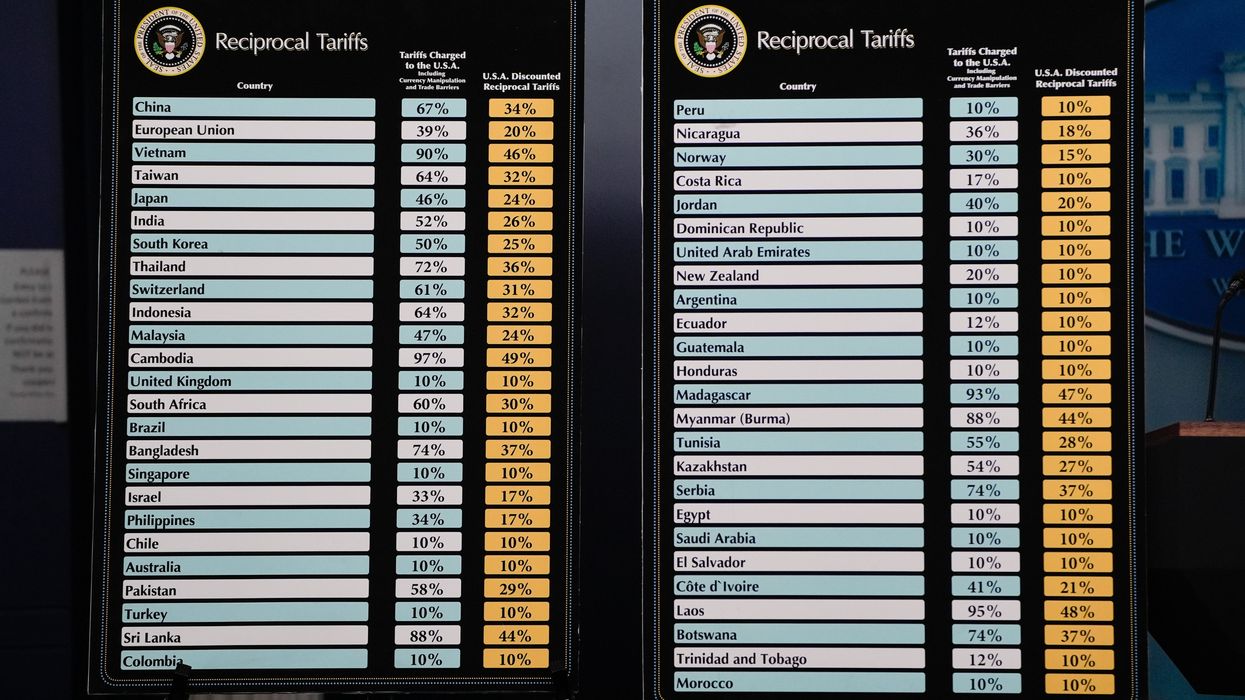"I have to tell you, we are honored to have Roy Williams with us. He is the author of the book Pendulum. He's not here to sell books," Glenn said Monday on his radio program.
Following Glenn's initial on-air discussion of Pendulum and subsequent interview with Williams, the book sold out on Amazon. Kindle versions are still available on Amazon and hard copies can be purchased online at Books-A-Million.
Glenn had a fascinating interview with Williams, whose remarkably successful background in advertising has given him unique insight into the American psyche and how 40-year cycles of history can help predict the future.
Read below or listen to the full segments for answers to these questions:
• How is Asia like America was 40 years ago?
• Why do we always take a good thing too far?
• What's the six-year transitionary window?
• What new technology was developed in 1923 to keep us working together?
• What was the most glorious American moment in our lifetimes?
• Will Williams use his magic powers for good or evil?
• When will the new voices for technology and literature emerge?
Listen to these segments from The Glenn Beck Program:
Below is a rush transcript of this segment, it might contain errors:
GLENN: He is here because we're going to cut a series with him for television because you need to understand what he's about to begin to lay out for you.
Welcome to the program, Roy. It's -- his microphone is off. Can we turn it on?
ROY: Okay.
GLENN: No, there it is.
ROY: There it is? It was just hiding.
GLENN: Yeah. It's great to have you here.
ROY: Well, it's good to be here, Glenn.
GLENN: Everybody -- I mean, literally everyone I have spoken to for the last, I don't know, month or so, I have said, "Have you read Pendulum? You have to read Pendulum." Is it available on Kindle?
ROY: I'm embarrassed to say, I don't know. When you write a book, as you well know, years before you read it, by the time it's finally published, you're really tired of that book.
GLENN: Yes, yes.
ROY: So I'm unaware of its availability, other than the fact that my coauthor, Michael Drew, called to say, "Can I have some of your private stash? I'm all out." I said, "No. I've been guarding my private stash. You're on your own, Michael."
GLENN: This is such an important book. First of all, give me quickly -- it is for download on Amazon. You can get it for Kindle.
ROY: Wonderful.
GLENN: Okay. So tell me -- tell me, first of all, your background, quickly.
ROY: Okay. I grew up working blue-collar in a steel shop. Got married at 18.
GLENN: Let's get to the -- you're a big deal in the ad world.
ROY: Well, I decided to -- I needed to make some extra money. So I went to work in the middle of the night for a radio station. Four years later, I was general manager. At age -- well, in my early 20s.
GLENN: Wow.
ROY: And began to make a lot of people a lot of money because I write better ads than most people.
GLENN: Okay.
STU: Wait. The ad genius is coming in here saying he doesn't know where his book is available. Is that really what happened?
JEFFY: I know.
ROY: Well, listen, I don't make money on the books. I make money because of the books.
STU: Oh. Okay. Yeah, books are a tough --
ROY: Yeah, it's -- you know, it's --
GLENN: Okay. So don't leave it at the radio station.
Can you give me any of the background of companies that you have --
ROY: Well, every couple of years, I go to Procter & Gamble. And they will assemble --
GLENN: A little different than a radio station general manager.
PAT: Yes.
ROY: And they assemble all the brand managers from 72 different nations. And I'll spend the day training them on what's happening in society and what you need to be aware of. There are several Procter & Gamble ads that show a direct reflection of those sessions and my influence. And the guy that was head of television production, until he retired last year, he had been there for like 37 years, he used to come and teach twice a year at our school. And then, of course, 1-800-GOT-JUNK is a big client. And we've grown them in five years, from just under 100 million -- took them 23 years to get to just under 100 million. 184 franchise partners.
And then in five years, we're now at over 250 million.
So that's real growth, wouldn't you say?
PAT: Seems like it.
ROY: Yeah, little things. Little things.
GLENN: Little things. So you're kind of a big deal.
The only reason why I set this up, it's so you know that this isn't just a guy who wrote a book. This is a guy trying to figure out why ads were working differently, you know, back in the day, ten years ago, then they were working 20 year ago, 30 years ago.
And you, like me, are fascinated by waves, generational waves, Kondratiev wave and patterns.
ROY: Patterns.
GLENN: Tell me about patterns.
ROY: Okay.
As an example of a pattern -- you know, the whole pendulum theory is based upon the 40 years that is repetitive throughout the Bible. I mean, it's dozens of times in the Bible. Things happen in 40-year sequences. Just do a search.
And that occurred to me one day. It kind of freaked me out in 2003.
Now, the point is, if you want to look at a pattern that has real use right now -- if you're selling in Asia any of the Asian countries, look at what was working incredibly well in America, exactly 40 years ago. Just subtract 40 years from today's date. Look at what was working really, really well in America 40 years ago. That will work incredibly well in Asia today.
PAT: Really?
STU: Really?
ROY: Guarantee it. Because Asia is on precisely the opposite cycle we're in.
GLENN: Can you give me an example of what you mean?
ROY: Okay. So right now we're in the upswing of a we. A we cycle is working together for the common good. It is groupthink. It is community. It is, you don't need to be a captain of the football team. You just need to be a productive player. And that groupthink is how we used to think of Asians, right?
PAT: Yeah.
ROY: Well, they're not like that anymore. You look at the Olympics, when they hosted them in Beijing, it's like, "No, they're into a me." And a me is all about excellence and, you know, do your own thing. Be number one. Second place is the first loser --
GLENN: It's why we were looking at them saying, they're more American than we are.
ROY: There you go. It's because they're in the upswing of a me, and we're in the upswing of a we. And at the tipping point, okay, which was basically 2003, is two ships passing in the night. And then we always take a good thing too far because, see, the we is a good thing, the me is a good thing. Neither of these are bad.
But we always take a good thing too far. And then we begin to mourn what we left behind, and we go back the other direction. And down toward the middle, things are always beautiful, which was about 2003.
And then you go too far to the left, you go too far to the right, you get to the zenith -- the zenith of the me was 1983. Michael Jackson is doing Thriller. And we worshiped heroes, at the zenith of the me.
And then we come down to 2003. Now that we're headed to the zenith of a we -- and it's a time of anti-heroes. There is no Billy Graham. There is no John Wayne. There are no classic heroes. You will see antiheroes. Destroyers.
You will see people who say, "I'm going to tear everything up because change needs to happen." And so Robin Hood, okay, was not a me hero. Robin Hood was a we hero. He was an outlaw intent on disrupting. Isn't that a word you hear a lot today?
GLENN: Yeah, disruption.
BILL: This is a disruptive technology. We're going to disrupt this business. We're going to disrupt that category.
And so disruption is the anti-hero thesis. And so it frustrates people. People mourn -- they have nostalgia for the me generation. But, sorry, we're not going to be there for a good, long time. We're headed towards the zenith of a we. Get used to it. You can like it. You can lump it. You can take it down the road and dump it. But it's just how it's going to be.
GLENN: Okay. So we are taught that the me generation is a very bad thing. It's all self-centered. The '80s were very bad because it was the me generation.
ROY: Only the zenith. Remember, the me generation began in 1963.
Now, when people are talking about the '60s, they're never talking about 1960, '61, or '62. That wasn't the '60s. That was the tail end of the '50s. '69 and '70 was the beginning of the '70s.
There's only a six-year window that we call the '60s. It's called the six-year transitionary window. '63, '4, '5, '6, '7, '8.
You look at everything that you think of about the '60s, and it was that window: '63 to '68. We just went through it again. 2003 through 2008, if you look at the web, everything that matters, okay? Connectedness, working together for the common good, social media, we generation. Right?
Facebook, all of that. 2003 to 2008. All of it.
Now, we always developed a new technology at the beginning of the we. 1923 was the beginning of the we previous to the current we. '23, and then the zenith was '43, World War II. All right?
What happened in 1923? A new technology to keep us working together for the common good.
GLENN: Radio and television.
ROY: Radio. Radio was born. And then ten years into it, you had Franklin Delano Roosevelt said, "Gather around children. We're going to have a fireside chat. We can pull through this." And so in '33, he's using the new technology. And I'm going, "Hey, we're there again." I'm sorry. This is 1936. This is 1936 all over again. You realize that?
GLENN: Yeah, I do. Not a lot of people like to hear that.
ROY: Well, I don't care. I'm sorry. It is what it is. And it's been happening for 3,000 years that can be absolutely proven with complete certainty. You just have to step back far enough from it and look objectively at history and go, "Oh, my gosh, the human heart goes through cycles, just like the seasons of seed, time, and harvest." You know, and it's a thing that happens. And we can avoid it. And if you're aware of it, you can mitigate it. If you're aware of it, you can kind of soften it and talk yourself down from the crazy --
GLENN: So give the earmarks of a we generation. Where we're going in. And the top of this is 2023.
ROY: Right. The zenith, yeah.
GLENN: So tell me -- and another 20 years down. So we're going to pass this again in another ten years. Right? Or, 20 years.
ROY: Yeah. Well, the upswing is a lot worse than the downswing.
The downswing is when it begins to lose steam and soften. And ten years after the zenith, starts coming the alpha voices of the new me. In technology and literature, it will be 2033. In technology and in literature, it will be the alpha voices that then go mainstream in 2043.
PAT: Well, how do we mitigate it and soften the way to the zenith?
GLENN: Well, first, define -- define what is happening to us. Show what this means to us.
ROY: Okay. Here's what happens in the upswing of a we, when you get to the halfway point, which for us was 2013. Right?
Everybody began with this beautiful dream of working together for the common good. And here's what we did: Prohibition was in the upswing of a we. Okay?
GLENN: Yeah.
ROY: We're going to clean this place up. We're going to straighten this stuff out. There's a lot of stuff that's wrong. And by golly, let's band together, and let's clean this up, and let's straighten this out.
And so it began as a beautiful thing. But then there is a certain sanctimonious holiness that sets in. I mean, right now, think about it. Political correctness is an expression of that, as is, do you recycle?
How many different groups do you put things in? How many different kinds of plastics do you recognize? And so -- and then organic. Is it organic, and is it local?
You know, and so there's all kinds of laws and little sub-laws of social behavior. And what happens is, we look at each other, and you say, "Do you know what, I don't think anybody is good anymore, except me and you? And lately, I've begun to have my doubts about you."
And so this idea of self-righteousness that nobody is measuring up, nobody is truly conservative anymore. Oh, my gosh, you have become moderate. I am truly conservative. You must go. No more of you.
And I say, "You know, we always do this. We always do this."
And I'm going, "I wish I knew how to stop it." But the only thing you can do is talk about it and make people aware that if you listen and you pay attention and you ask yourself, "Now, is this person truly stupid and evil, or are they seeing something and thinking something that I'm not seeing and thinking -- and if I just calm down and listen and try to understand them, then maybe we can actually have a dialogue and maybe we can actually find a solution."
But nobody is in the frame of mind to do that right now. People would rather be angry than bored. People would rather be frightened than bored.
PAT: Has anybody ever mitigated the zenith?
ROY: No. I'm hoping we will be the first. I'm counting on you guys.
(laughter)
STU: Oh, good.
PAT: Wow. Wow.
ROY: That's why I'm here. I've decided that you are the solution.
PAT: Wow.
GLENN: We're in the category of not being real popular with a lot of people. A lot.
(chuckling)
BILL: Here's what's about to happen: People right now are reevaluating their positions on everything. Everything. People are beginning to realize, "You know what, either I double down and take this to the next level --
PAT: And a lot are.
ROY: Right? Or they say, "Hey, maybe it is time to slow the thing down, take a new census, and decide who maybe isn't as far from me as what I thought."
GLENN: Roy, I said on the air ten years ago, there's going to come a time where you don't recognize everything, and everything you thought you could count on will be -- everything you thought would be solid is liquid, and liquid is solid.
ROY: That's true. And what happens is, right now, you know what the great hunger is for? It's nostalgia. I wrote recently in the Monday morning memo that Norman Rockwell did not show us America as it really was. He showed us America as it could be, should be, might be, ought to be. That he was so convincing with his illustrations, that we remembered having experiences we never had.
And so this nostalgia for this beautiful dream, that really never was, this perfect America that was in the past, this hunger for Andy Griffith and Mayberry, okay?
Hang on a second, guys. I got news for you. Say it with me. Early '60s, North Carolina is this little town of white people with no blacks, no racial tension. Now, get serious. Come on. And it's kind of like -- it was a fantasy. It was a straight-up fantasy, as was Norman Rockwell. But our generation looks back at this imaginary past, and we say, "We want to go back to that." And I'm going, "Well, good luck with that. You can't get there."
GLENN: Ever.
ROY: But everybody is hungry for it. Everybody wants that. Everybody says, "Why can't we go back to how we imagined it used to be?"
GLENN: How do you get people to look forward and say, "Look how good it can be, especially now with technology, look how great it can be, unless we kill each other."
ROY: Well, I think you just said it, Glenn, is if you talk about what could be -- if you talk about, if we do this, this might be what we achieve, and if you look forward at possibilities and at paths that could produce those changes, people cannot go -- this is a fundamental premise of good marketing. A person can never go anyplace they have not first already been in their mind.
GLENN: Uh-huh.
ROY: And so in your business and in mind, we have to take people places in their mind. We have to make them see possible futures because once they've been there in their mind, they can create that future. But if we show them terrifying possible futures, they will create those. If we show them brighter possible futures, they will create those.
GLENN: Okay. So when we come back, I want this answer for myself. This is like a great therapy session for me. I -- we feel like we have to tell people and warn people what's ahead. For instance, I want to talk to you about, what do you think is ahead after the election, if one party or the other says, "It was rigged." Terrifying. The things that are in front of us are terrifying. But how do you warn people about that, plus tell them it doesn't have to be like that, when most people don't want to hear either.
ROY: Okay.
GLENN: We'll get to that in a second.
[break]
GLENN: I wish you were here in the studio with us because I think you would really like him. Roy Williams is with us. He is the author of Pendulum. He is an ad guy that saw that ads were not working. What was working slowly started to not work and trying to figure out why he stumbled into a much bigger answer than I think the whole world is looking for.
Give me an ad that worked during the me that will not work now and how you would fix it.
ROY: Me. Sixty seconds: You are standing in the snow, five and one half miles above sea level, gazing at a horizon hundreds of miles away. It occurs to you that life here is very simple: You live or you die. No compromises. No whining. No second chances. This is a place constantly ravaged by wind and storm, where every ragged breath is an accomplishment. You stand on the uppermost pinnacle of the earth. This is the mountain they call Everest. Yesterday, it was considered unbeatable, but that was yesterday.
As Edmund Hillary surveyed the horizon from the peak of Mt. Everest, he monitored the time on a wristwatch that had been specifically designed to withstand the fury of the world's most angry mountain.
Rolex believed Sir Edmund would conquer the mountain, and especially for him, they created the Rolex Explorer.
GLENN: It would not work today. The opposite, next.
[break]
GLENN: Welcome to the program. Glad you're here.
We're with Roy Williams. He is the author of Pendulum. You can buy it through Kindle, but you can't buy a hard copy anymore. It's completely sold out. And I don't think they're going to make another one of it. I found it. It was written in 2012. You just gave a Rolex commercial that you wrote, number one ad for Rolex of all time. It won't work now, according to your theory, because that was about the rugged individual standing alone at the peak.
ROY: Right. Right.
GLENN: Today, how would you fix that?
ROY: Rolex, the watch for people who want to make a difference.
PAT: How do I make a difference with a watch?
ROY: Okay.
Know the CEO who values time, who knows the importance of spending time wisely. Okay? And doing the right things with your time. Time is a commodity. Time and money are interchangeable. You can always save one by spending more of the other. Time and money are interchangeable.
When you sell this idea of time and money being interchangeable -- a good CEO, a good leader is a person who invests time wisely in the right things, the right people, the right efforts, then now all of a sudden time, matters the most to people who make a difference. And so when you begin --
GLENN: Is this off the top of your head? Wow.
ROY: Yeah, yeah, yeah. What I'm saying is the idea is, once you frame the conversation in the right direction, you just pick up the right words along the way.
PAT: That's great.
GLENN: So let's take this, Trump this weekend is -- let me give you a few scenarios.
ROY: All right.
GLENN: A, Trump this weekend is talking about a rigged election. If -- if he creates a rigged election and a -- a place to where he says, "This is unfair and I don't accept the outcome." Or he just has his people saying that -- you know, the supporters saying that, even though he's lightly saying, "No, that's fine. It was rigged."
It causes -- we're at a -- we're at an inflection point. Trouble.
Reframe that to get people to listen.
ROY: Do you want to know what I believe was the most beautiful, the most glorious, the most American moment in our lifetimes? The time when we as a nation were at our best and brightest, shining like a star for the rest of the world to see? Do you know when that was?
The moment of the hanging chads. Think about it. What was it, like three months we didn't know who would be president?
JEFFY: Yeah.
PAT: Uh-huh.
ROY: Kerry and Bush. And wait a minute, one of the candidate's brother was the governor of the state counting the chads.
PAT: Right.
ROY: Now, think this through for me for a moment. Right? And for -- what was it? Three months, everybody was -- America was without a president. We didn't know what to do. We're holding our breath. And here's the beautiful thing: No one started shooting.
PAT: Uh-huh.
ROY: That is the glorious thing about our nation, is the peaceful transfer of power. Gentlemen, it's who we are.
So I have no fear. Donald Trump might get worked up. He might get a few little people worked up. But, you know what, we are America. And we've been through this before. And no one will start shooting.
PAT: You're totally confident in that?
ROY: No, I'm just reframing -- I'm reframing the question.
PAT: Oh.
GLENN: He's reframing it.
ROY: What I'm saying, if we start talking about, everybody is going to start shooting, I promise you, we encourage people to start shooting.
JEFFY: Yes.
PAT: Yeah.
ROY: People will do what you have described. That is the fundamental premise of all advertising. When you describe it clearly, they imagine themselves doing it. They imagine themselves doing it.
GLENN: So how do you warn people -- okay. Deutsche Bank is on the edge. Europe is on the edge. This repeats the cycle from the 1930s. We're in the pendulum swing. And you can see it all happening. That's a domino effect here. You need to be prepared. And not listen to the people who are living in their little patterns that they lived in school that are telling you, "No, there are systems to save all this. They haven't seen what's coming."
ROY: I agree. What you have to do is when you start talking about possible futures, list all of the possible futures, not just one. And what happens is, when a person says, "You know, it could turn out this way. It could turn out this way." They are no less likely to prepare for the worst-case scenario, they're just less terrified. There's a difference.
And to say now -- by the way, you can never sell a positive about yourself -- or even as a company. You can't sell the upside without admitting a downside. You have to admit the weakness that corresponds to the strength, or you have no credibility.
Likewise, if you -- and this is what both of our candidates don't understand. It's why most of America doesn't like either one of them, is they're incapable of admitting a weakness or a downside.
GLENN: Uh-huh.
JEFFY: Right.
ROY: And so here's what I'm saying: Whenever you're talking about a possible apocalyptic future, right? Yeah, that is a real possibility. But if you want to have credibility, you also have to talk about how it might be possible that we can dodge the bullet.
And so, remember, big idea, nuts and bolts, entertainment, hope. Those are the four steps. Everybody always has a big idea. The nuts and bolts are the step by step, the how-to. Entertainment. You're the king of that. But hope. Hope.
GLENN: I'm the worst at that. I'm a pauper.
ROY: What I'm saying is, when you give people hope, now they become addicted to your message, because it isn't just entertaining with the big idea and nuts and bolts step by step, but there's also a possible escape plan and a possible light at the end of the tunnel. And if you show them the light at the end of the tunnel, they will find their way to it. It will make that future happen.
PAT: How is Barack Obama so popular then? Because he never admitted to any downside. He never admitted to any faults either. He never said he did anything wrong.
ROY: But what was his slogan? Yes, I can. Yes, I can.
PAT: Hope and change. And, yes, I can.
ROY: What is it, yes, I can?
PAT: Yes, we can.
ROY: There you go.
PAT: Yeah.
ROY: See, he was speaking the language of we to a we generation. And then he used social media, which was the tool of the we generation. And so he was in step with the times, period.
JEFFY: Yeah.
PAT: Hmm.
ROY: And he was a little bit more in touch with the hearts of the people and the way they were thinking.
GLENN: This is why these guys -- I watched the debate. And they both looked like 1952.
ROY: Yeah.
GLENN: They looked so far out of date, that it's just -- and that's why the millennial generation is just disconnecting from everything.
ROY: The idea that -- and, by the way, this idea of upside and downside, positives and negatives. Let's camp there for just a second.
Did you know that every screenwriter knows, whether it's a TV show, a movie, a novel, or a comic book, or a video game, the only interesting characters -- the only magnetic characters are those that have vulnerability, a weakness, or a flaw.
And we love flawed characters. We do not -- we're not really attracted to two-dimensional, cardboard-cutout, phony characters. But yet, politicians seem compelled to believe that's what they have to present. And it's not credible anymore.
Okay? And so when a person -- Glenn, you do a really good job of this. You do a really good job of showing your vulnerability. Now, admittedly, you do a not so good job of shining hope like a flashlight. You do a great job --
GLENN: No, a flashlight, as long as you're comparing it to the sun.
ROY: As long as you're shining darkness, yeah, you're doing a great job.
The point is, this idea of admitting a vulnerability, a weakness, or a flaw -- I was watching the video of you speaking at the Red State Gathering. Can I quote you?
GLENN: I don't know.
ROY: Okay. As close as I can remember -- and it was like an i Phone thing. This was not slick media. And you said, "The other day I got my children together and I told them, 'For the first time in your life, your dad is not sure what to do. I don't have the answers.'" Do you remember saying in a?
GLENN: Yes, I do.
ROY: And I'm going, "That's wonderful vulnerability. People love that stuff." Okay?
Now, would it terrify you for a senator or a congressman to ever say that? No, it would make you adore them. You know what I mean?
And you said, "I told my kids, if you have some answers, please clue me in, because I'm really looking for some right now."
It's hard not to love that guy. Now, what I'm saying is, when I'm talking about a vulnerability, a weakness, or a flaw, a we generation will have it, or they will reject you.
And I'm saying that's why you've not been rejected is because you're quick to admit when you're wrong or you come up short. That's your single best quality.
GLENN: Well, I thank you for that. Now I'm looking for hope.
PAT: Plus, you're corpulent, which helps too.
GLENN: Thank you.
PAT: And you're loveable.
ROY: And you have nice hair.
(laughter)
GLENN: So I'm looking for -- you know, you said we have to draw a point on the horizon. I think this is -- I'm a fan of Walt Disney because I think he had this in spades. He's the reason why we went to the moon. I'm convinced of it. Because he did Man in Space in '55, and he convinced Americans -- this is Eisenhower, "Walt, you did it. I've been trying to convince the Pentagon. You convinced the American people we can do it."
But what -- trying to get there -- it's the nuts and bolts. I could tell you what tomorrow can look like, but the nuts and bolts on getting there -- how do you get there when you've got a society that is intentionally imposing blindness on themselves?
ROY: Okay. I think it was David in the Psalms that said, "My people perish for lack of vision."
GLENN: Right.
ROY: My people perish for lack of vision. A great leader names a beautiful dream. John F. Kennedy said, "Let's go to the moon. Let's go to the -- why not? Let's go to the moon. We're America. By golly. Let's do it. Let's go to the moon." Nobody said, "Really? The moon?" He's like, "Yes, the moon. Let's do that, just to show them we can."
Like, "All right." And so it energized the whole nation, right? And so whenever you say, "Let's do this thing. Let's make this outcome happen."
And if you're enthusiastic about it, enthusiasm is contagious. And people start feeling that hope. They start feeling that enthusiasm when you name the impossible dream and say, "Let's do this." Now, here's the beautiful thing. Going to the moon can be measured, can't it?
GLENN: Yes.
ROY: It's not an abstraction. Whenever you say, "Let's do this thing, and here's how we're going to measure it. And let's make this thing happen. Are you with me?"
And people go, "Yeah, let's do that."
All right. Let's do that.
Now, what happens is -- and I just want to make this plain. I believe it's time for somebody to declare peace in America. We're declaring war on each other. We're at war on these people. War on those people. We hate you. We hate you. You're the outsider. You're the one who is stupid and evil, not me.
And I'm going, "You know what, if it's easy to declare war, why can we not declare peace and say, 'Hey, look, as for me and my house, here's what we're going to do. We're going to go this direction. We're going to accomplish this, and you can join us or you can watch us do it. But we're doing it. We're going to do this. We're going to make this happen. We're going to bring this about.'" And people go, "I kind of like the sound of that. I think I'm going to get on that team because that's a good thing. I would like to see that happen. I want to be part of making that happen."
GLENN: So I think in a way, that's kind of what we've done without the language. We've tried to do that. But we don't know how to measure that. How do you measure that?
ROY: Well, first thing --
PAT: How do you get people to say, "Yeah, let's do that?" Because I don't think people want peace right now.
GLENN: I don't know.
ROY: They do.
GLENN: They do.
JEFFY: It doesn't feel like it.
GLENN: It doesn't feel like it because --
PAT: It really doesn't feel like it.
ROY: Right. People are looking for adventure, okay? People want purpose, and they want adventure.
And if the only thing they're being presented with is stuff to get angry about, that's an adventure, and that's a purpose. And, remember, they would rather be angry than bored. They would rather be frightened than bored. But adventure can just as easily be aimed in a different direction.
That's beautiful thing. Why don't we do this? And says, you know what, we're going to go this direction whether you help us or not. We're going to do this.
And then people get infected with it, and they spread it. In other words, you don't need to do all the work yourself. You just need to figure out this thing that should happen, can happen, might happen, and then you --
GLENN: We did it with the 9/12 Project. The problem is that it -- we gave it to people, and then it lost its -- it's lost its Northern Star.
ROY: Well, yeah, every day you have to fan the flames, and you have to give people progress to goal. How are we doing? They have to see the thermometer. They need to know.
And you need to find -- remember, there's a marvelous video about the first follower. We'll maybe look at it later together. But it says leaders are overrated. A leader is just a loan nut, until they have a first follower. And it's the first follower that attracts the second follower.
And a good leader gives the credit to the followers. Okay? And followers -- it's like sheep beget sheep. Shepherds do not beget sheep. Shepherds don't have sheep. Sheep have sheep. Followers find other followers.
And so this idea of naming the goal, articulating the vision, and fanning the flames of it, and continuing to keep enthusiasm high and then empowering the followers and encouraging the followers -- spotlighting the followers so that they and their accomplishments are being celebrated, guess what happens, everybody wants on that team.
GLENN: Boy, I'm really glad that you're on the side of peace and love and hope and all of that stuff because I'd hate to have you use your power for darkness. There's a lot of power there.
The name of the book is Pendulum. Roy is going to be with me today because we're going to be cutting a few shows for television. Because you need to understand this theory.
And, Roy, it's a pleasure to have you. It's a pleasure to have you.
ROY: It's good to be here, Glenn.
[break]
GLENN: I will tell you probably too much, as I always do. I have been looking for somebody who thinks like I do about the future, and everybody I have found is always on the other side. Now, I don't know -- I don't know his politics at all.
PAT: I don't want to.
GLENN: And I don't want to. I don't want to.
PAT: But I'm guessing he's not -- but I don't know either. You're right. I don't want to know.
GLENN: Well, I don't know. I don't know. But he speaks my language.
PAT: Hugely.
GLENN: And I have been looking for somebody to help us figure out how to move forward. I know where we want to go. I don't know how to move forward.
PAT: And he does.
GLENN: And he's brilliant. He's brilliant. Roy Williams. He's going to join me, I hope, at 5 o'clock tonight for a Think Tank episode. Bill Weld is also going to join me for that. And we'll see you back here tomorrow.
Featured Image: Screenshot of author Roy Williams, featured Monday, October 17, 2016 on The Glenn Beck Program.












